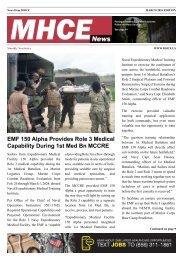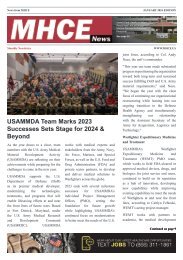M2CC MARCH 2024
You also want an ePaper? Increase the reach of your titles
YUMPU automatically turns print PDFs into web optimized ePapers that Google loves.
News from <strong>M2CC</strong><br />
<strong>MARCH</strong> <strong>2024</strong> EDITION<br />
Top Marine Returns to Full<br />
Duty Status as Commandant<br />
After Cardiac Arrest Last Year<br />
See page 4<br />
Newsletter<br />
WWW.<strong>M2CC</strong>.US<br />
One of NASA’s<br />
Newest<br />
Astronauts is<br />
a Former Navy<br />
Test Pilot from<br />
California; Will<br />
She Make it to<br />
the Moon?<br />
Jessica Wittner is getting some deserved time off —<br />
just a day or so to decompress with family before<br />
jumping back into the work of being one of NASA’s<br />
newest astronauts.<br />
“I’m filled with excitement and energy right now,”<br />
Wittner told The Bee in a phone interview Tuesday,<br />
following a graduation ceremony at Johnson Space<br />
Center in Houston.<br />
This is the dream scenario for the Clovis native and<br />
Buchanan High School graduate.<br />
She was 12 when she first verbalized wanting to be an<br />
astronaut. She joined the U.S. Navy after graduation<br />
and became an aviation mechanic. She earned a<br />
Bachelor of Science in Aerospace Engineering from<br />
the University of Arizona and a master’s degree<br />
from the U.S. Naval Postgraduate School.<br />
She became a test pilot and was project officer with<br />
Test and Evaluation Squadron VX-31, the Dust<br />
Devils, in China Lake. She served on engineering<br />
teams in the development and flight tests for the<br />
F/A-18E-F Super Hornet and was heading the the<br />
Strike Fighter Squadron VFA-151 at at Naval Air<br />
Station Lemoore when she was accepted by NASA.<br />
Wittner is in rarefied company.<br />
NASA has graduated just 360 NASA astronauts<br />
since the original “Mercury Seven” were chosen<br />
in 1959. That crew included John Glenn and Alan<br />
Continued on page 10
2 | <strong>M2CC</strong> - News www.m2cc.us <strong>MARCH</strong> <strong>2024</strong> EDITION WWW.<strong>M2CC</strong>.US<br />
Newsletter | 3<br />
Albany Police Department<br />
VISION<br />
The Albany Police Department is a nationally accredited law<br />
enforcement agency committed to providing excellence in policing, by<br />
enhancing the safety and security of individuals through valuing human<br />
life and building partnerships that strengthen relationships within our<br />
community.<br />
MISSION<br />
Our mission is to develop our personnel to deliver quality law<br />
enforcement services with professionalism, integrity, and compassion<br />
and to ensure with every interaction we are building trust and modeling<br />
ethical policing in our community.<br />
CORE VALUES<br />
Professionalism<br />
Respect<br />
Integrity<br />
Accountability<br />
Interpersonal Skill
4 | <strong>M2CC</strong> - News www.m2cc.us <strong>MARCH</strong> <strong>2024</strong> EDITION WWW.<strong>M2CC</strong>.US<br />
Newsletter | 5<br />
After suffering a cardiac arrest more than four months ago<br />
and subsequently undergoing open-heart surgery, Gen.<br />
Eric Smith returned to full duty status as commandant<br />
of the Marine Corps on Tuesday, according to a press<br />
release from the service.<br />
Smith, who collapsed near his home in Washington,<br />
D.C., on Oct. 29, previously said that he intended to<br />
return to work as commandant. In January, he underwent<br />
open-heart surgery to repair a congenital defect that<br />
doctors said contributed to his hospitalization.<br />
He took back the reins of the service from Gen.<br />
Christopher Mahoney, the assistant commandant of the<br />
Top Marine<br />
Returns to Full<br />
Duty Status as<br />
Commandant After<br />
Cardiac Arrest<br />
Last Year<br />
Marine Corps, who had been serving in both positions<br />
since November.<br />
The Associated Press reported last week that Smith had<br />
quietly returned to the Pentagon multiple times over the<br />
last month and was preparing to return to duty.<br />
"Gen. Smith and his family appreciate the full support of<br />
Congress; the leadership at the Department of Defense,<br />
Department of the Navy, the Joint Force; and all who<br />
extended them their well wishes during his recovery," the<br />
Marine Corps press release said late Tuesday evening.<br />
A spokesperson for Smith, Maj. Josh Larson, told<br />
Military.com that the decision for the commandant<br />
to return to full duty status involved meeting certain<br />
recovery milestones, was done under the advice of his<br />
doctors, and after consulting with Department of the<br />
Navy leadership.<br />
A month before his cardiac arrest, Smith was confirmed<br />
as commandant amid a congressional roadblock headed<br />
by Alabama Sen. Tommy Tuberville, a Republican, who<br />
held up military confirmations in protest of a Pentagon<br />
policy reimbursing travel expenses for reproductive<br />
care, including abortions.<br />
In December, Tuberville dropped his remaining holds.<br />
Smith collapsed near Marine Barracks Washington two<br />
days after the Marine Corps Marathon, which he did<br />
not participate in, but appeared at. Bystanders called<br />
911 and performed CPR on Smith. Lt. Gen. Karsten<br />
Heckl, a three-star, briefly held the position of acting<br />
commandant until Mahoney was confirmed.<br />
Just weeks after his<br />
hospitalization, Smith<br />
reassured Marines in his first<br />
public-facing appearance in a<br />
video posted to social media.<br />
At the time, he said, "I'm still<br />
in the fight; I need you to be<br />
in the fight."<br />
Navy Secretary Carlos<br />
Del Toro said Tuesday he<br />
was "pleased to report that<br />
Gen. Eric Smith has fully<br />
recovered," according to a<br />
post on X, formerly known<br />
as Twitter. "I am grateful to<br />
Gen. Mahoney for his steady<br />
hand at the helm of the<br />
[Marine Corps], and I look<br />
forward to seeing Gen. Smith<br />
back in action."
6 | <strong>M2CC</strong> - News www.m2cc.us <strong>MARCH</strong> <strong>2024</strong> EDITION WWW.<strong>M2CC</strong>.US<br />
Newsletter | 7
8 | <strong>M2CC</strong> - News www.m2cc.us <strong>MARCH</strong> <strong>2024</strong> EDITION WWW.<strong>M2CC</strong>.US<br />
Newsletter | 9<br />
Appeals Court Supports Disabled<br />
Veterans’ Rights to Appeal VA Decisions<br />
About Caretaker Benefits<br />
veterans and caregivers who have received decisions<br />
for caretaker benefits, according to the decision.<br />
The judges noted in their decision that the VA has<br />
issued notices of “potential appeal rights” to all the<br />
identified veterans and caregivers.<br />
The National Veterans Legal Services Program<br />
described the victory as securing “the rights of<br />
hundreds of thousands of veterans and caretakers like<br />
the Beaudettes … who were unjustly denied, removed<br />
or had their benefits reduced.”<br />
The nonprofit legal services program has also<br />
represented a class of veterans and caretakers similarly<br />
affected.<br />
Since the 2021 ruling, more than 14,000 veterans and<br />
their caretakers have appealed decisions or submitted<br />
a supplemental claim for review, according to the legal<br />
services program.<br />
“The veterans court ordered the [VA] secretary to notify<br />
claimants of their right to appeal adverse caregiver<br />
program determinations to the board,” according to<br />
court documents.<br />
But the VA also appealed the ruling in 2023 to the U.S.<br />
Court of Appeals for the Federal Circuit Court, which<br />
last week upheld the decision granting the Beaudettes<br />
the right to appeal.<br />
“The Beaudettes had no adequate alternative means to<br />
obtain the relief,” other than to file an appeal before<br />
the veterans’ court, the judges wrote. “We conclude the<br />
Beaudettes and other similarly situated veterans and<br />
caregivers have an indisputable right to judicial review<br />
of caregiver program decisions.”<br />
WASHINGTON — A federal appeals court has rejected<br />
a claim by the Department of Veterans Affairs that would<br />
block the right of hundreds of thousands of disabled<br />
veterans from challenging decisions of a VA caregiver<br />
program over benefits that support in-home assistance.<br />
The U.S. Court of Appeals for the Federal Circuit ruled<br />
Feb. 27 that Jeremy Beaudette, a Marine Corps veteran<br />
who suffered multiple head injuries from five tours<br />
of duty in Iraq and Afghanistan, and his wife, Maya<br />
Beaudette, who quit her job to care for him, had the<br />
right to challenge a 2018 decision by the VA Program<br />
of Comprehensive Assistance for Family Caregivers to<br />
deny them benefits.<br />
The program gives benefits to family caregivers<br />
to provide at-home care for disabled veterans. The<br />
assistance includes a monthly stipend ranging from<br />
$1,800 to $3,000, as well as training and other support.<br />
Veterans must suffer from debilitating injuries impacting<br />
daily functions to qualify for the program.<br />
Jeremy Beaudette had suffered multiple concussions<br />
while serving in the Marine Corps from 2002 to 2012<br />
that resulted in a traumatic brain injury and rendered him<br />
legally blind, according to the National Veterans Legal<br />
Services Program, which represented the Beaudettes.<br />
A three-judge panel last week upheld a 2021 decision<br />
by the U.S. Court of Appeals for Veterans Claims that<br />
allows the couple to proceed with their case before the<br />
Board of Veterans’ Appeals.<br />
The panel rejected the VA’s argument that the caretaker<br />
program had made a “medical determination” that was<br />
not subject to court appeal.<br />
“There is a strong presumption favoring judicial review<br />
of agency actions,” the judges wrote in their decision.<br />
“The [VA] has not met its burden to show all caregiver<br />
program decisions are exempt from judicial review.”<br />
The VA and Department of Justice could choose to<br />
appeal their case to the U.S. Supreme Court but declined<br />
to comment on pending litigation.<br />
The couples’ lawsuit, which had been certified as a classaction<br />
case, could potentially affect more than 400,000<br />
Jeremy and Maya Beaudette had originally applied<br />
for caregiver program benefits in 2013 because of<br />
his “inability to perform activities of daily living and<br />
his substantial need for supervision and protection,”<br />
according to court documents.<br />
Though the VA had “consistently” found the<br />
Beaudettes eligible for benefits through the caretaker<br />
program, he was disqualified in February 2018 after<br />
seeking to delay his annual reassessment because he<br />
was recovering from two surgeries, according to the<br />
findings in the court decision.<br />
The Beaudettes sought to appeal the decision in July<br />
2020 before the Board of Veterans’ Appeals, but the<br />
VA maintained its decision could not be overruled.<br />
The Beaudettes then challenged the VA’s decision to<br />
block their appeal by filing a claim in 2020 before<br />
the U.S. Court of Appeals for Veterans Claims. The<br />
court supported the appeal in 2021 and ordered the<br />
VA to notify all veterans and caregivers who had ever<br />
received a caregiver program decision.
10 | <strong>M2CC</strong> - News www.m2cc.us <strong>MARCH</strong> <strong>2024</strong> EDITION WWW.<strong>M2CC</strong>.US<br />
Newsletter | 11<br />
Why Are Clocks<br />
Set Forward in the<br />
Spring? Thank<br />
Wars, Confusion<br />
and a Hunger for<br />
Sunlight!<br />
Once again, most Americans will set their clocks forward<br />
How we came to move the clock forward in the<br />
by one hour this weekend, losing perhaps a bit of sleep<br />
spring, and then push it back in the fall, is a tale that<br />
but gaining more glorious sunlight in the evenings as the<br />
spans over more than a century — one that’s driven<br />
days warm into summer. . There’s been plenty of debate<br />
by two world wars, mass confusion at times and a<br />
over the practice but about 70 countries currently use<br />
human desire to bask in the sun for a long as possible.<br />
Shepard, who was the first American to travel into<br />
space.<br />
Wittner’s training class, selected in 2021, was just<br />
10 people chosen from a pool of 12,000 applicants.<br />
Over the past two years, the astronauts completed<br />
training across five subject categories, according<br />
to NASA. They learned to operate and maintain<br />
International Space Station systems. They trained<br />
for spacewalks, learned Russian and robotics skills,<br />
and operated a T-38 supersonic training jet.<br />
It was during her first run in an underground pool<br />
in a simulation of the ISS that Wittner felt the full<br />
impact of what it means to be an astronaut. Standing<br />
there in a full space suit, “that’s really when it starts<br />
to hit.”<br />
A trip to the moon?<br />
Continued from page 1<br />
Individual missions have yet to be assigned, but<br />
could involve anything from research aboard the<br />
International Space Station to launching commercial<br />
spacecraft, or deep-space missions to destinations<br />
including the moon, NASA said.<br />
In 2017, the space agency launched the Artemis<br />
project, a series of new lunar missions with the<br />
ultimate goal of eventually launching a mission to<br />
Mars. An uncrewed test flight was launched in 2022.<br />
A second, fly-by mission was scheduled to happen<br />
this year but was postponed until 2025.<br />
“I would love to go to the moon,” says Wittner,<br />
knowing its the consensus feeling among her peers.<br />
“I think you’re going to hear that from a lot of<br />
people.”<br />
Of course, Wittner is a firm believer in following<br />
passions — and her passion is exploration in all of<br />
forms. Even though we’ve already been to the moon,<br />
she says, these next visits will unlock an amazing<br />
amount of new information and opportunity.<br />
“That’s like the next frontier right now,” she says<br />
“We know what questions need to be answered.”<br />
what Americans call daylight saving time.<br />
DALLAS — Once again, most Americans will set their<br />
clocks forward by one hour this weekend, losing perhaps<br />
a bit of sleep but gaining more glorious sunlight in the<br />
evenings as the days warm into summer.<br />
Where did this all come from, though?<br />
There’s been plenty of debate over the practice, but<br />
about 70 countries — about 40% of those across the<br />
globe — currently use what Americans call daylight<br />
saving time.<br />
While springing the clocks forward “kind of jolts<br />
our system,” the extra daylight gets people outdoors,<br />
exercising and having fun, says Anne Buckle,<br />
web editor at timeanddate.com, which features<br />
information on time, time zones and astronomy.<br />
“The really, really awesome advantage is the bright<br />
evenings, right?” she says. “It is actually having<br />
hours of daylight after you come home from work to<br />
spend time with your family or activities. And that is<br />
wonderful.”<br />
Here are some things to know so you’ll be conversant<br />
about the practice of humans changing time:<br />
In the 1890s, George Vernon Hudson, an astronomer<br />
and entomologist in New Zealand, proposed a time<br />
shift in the spring and fall to increase the daylight.
12 | <strong>M2CC</strong> - News www.m2cc.us <strong>MARCH</strong> <strong>2024</strong> EDITION WWW.<strong>M2CC</strong>.US<br />
Newsletter | 13<br />
And in the early 1900s, British home builder William Willett, troubled that people weren’t up enjoying the<br />
morning sunlight, made a similar push. But neither proposal gained enough traction to be implemented.<br />
Germany began using daylight saving time during World War I with the thought that it would save energy. Other<br />
countries, including the United States, soon followed suit. During World War II, the U.S. once again instituted<br />
what was dubbed “war time” nationwide, this time year-round.<br />
In the United States today, every state except Hawaii and Arizona observes daylight saving time. Around the<br />
world, Europe, much of Canada and part of Australia also implement it, while Russia and Asia don’t currently.<br />
After World War II, a patchwork of timekeeping emerged across the United States, with some areas keeping<br />
daylight saving time and others ditching it.<br />
“You might have one town has daylight saving time, the neighboring town might have daylight saving time but<br />
start it and end it on different dates and the third neighboring town might not have it at all,” says David Prerau,<br />
author of the book “Seize the Daylight: The Curious and Contentious Story of Daylight Saving Time.”<br />
At one point, if riders on a 35-mile (56-kilometer) bus ride from Steubenville, Ohio, to Moundsville, West Virginia,<br />
wanted their watches to be accurate, they’d need to change them seven times as they dipped in and out of daylight<br />
saving time, Prerau says.<br />
So in 1966, the U.S. Congress passed the Uniform Time Act, which say states can either implement daylight<br />
saving time or not, but it has to be statewide. The act also mandates the day that daylight saving time starts and<br />
ends across the country.<br />
Confusion over the time change isn’t just something from the past. In the nation of Lebanon last spring, chaos<br />
ensued when the government announced a last-minute decision to delay the start of daylight saving time by a<br />
month — until the end of the Muslim holy month of Ramadan. Some institutions made the change and others<br />
refused as citizens tried to piece together their schedules. Within days, the decision was reversed.<br />
“It really turned into a huge mess where nobody knew what time it was,” Buckle says.<br />
WHAT WOULD IT BE LIKE IF WE DIDN’T CHANGE THE CLOCKS?<br />
Changing the clocks twice a year leads to a lot of grumbling, and pushes to either use standard time all year, or<br />
stick to daylight saving time all year often crop up.<br />
During the 1970s energy crisis, the U.S. started doing daylight saving time all year long, and Americans didn’t<br />
like it. With the sun not rising in the winter in some areas till around 9 a.m. or even later, people were waking up<br />
in the dark, going to work in the dark and sending their children to school in the dark, Prerau says.<br />
“It became very unpopular very quickly,” Prerau says.<br />
And, he notes, using standard time all year would mean losing that extra hour of daylight for eight months in the<br />
evenings in the United States.<br />
A NOD TO THE EARLY ADOPTERS<br />
In 1908, the Canadian city of Thunder Bay — then the<br />
two cities of Fort William and Port Arthur — changed<br />
from the central time zone to the eastern time zone for<br />
the summer and fall after a citizen named John Hewitson<br />
argued that would afford an extra hour of daylight to<br />
enjoy the outdoors, says Michael deJong, curator/<br />
archivist at the Thunder Bay Museum.<br />
The next year, though, Port Arthur stayed on eastern<br />
time, while Fort William changed back to central<br />
time in the fall, which, predictably, “led to all sorts of<br />
confusion,” deJong says.<br />
Today, the city of Thunder Bay is on eastern time, and<br />
observes daylight saving time, giving the area, “just<br />
delightfully warm, long days to enjoy” in the summer,<br />
says Paul Pepe, tourism manager for Thunder Bay<br />
Community Economic Development Commission.<br />
The city, located on Lake Superior, is far enough north<br />
that the sun sets at around 10 p.m. in the summer, Pepe<br />
says, and that helps make up for their cold dark winters.<br />
Residents, he says, tend to go on vacations in the winter<br />
and stay home in the summer: “I think for a lot of folks<br />
here, the long days, the warm summer temperatures, it’s<br />
a vacation in your backyard.”
14 | <strong>M2CC</strong> - News www.m2cc.us <strong>MARCH</strong> <strong>2024</strong> EDITION WWW.<strong>M2CC</strong>.US<br />
Newsletter | 15<br />
Pentagon’s Priority<br />
on AI Spending<br />
Could Shield it<br />
From Cuts<br />
March 11 under Defense financing caps set by<br />
the bipartisan debt limit deal, which holds down<br />
spending across the department.<br />
The reason why AI might escape cuts is twofold:<br />
There’s a growing prioritization of AI within the<br />
department, and lawmakers who are convinced<br />
of the technology’s potential are championing the<br />
Defense Department’s expenditures in this area,<br />
even as they look to trim spending elsewhere.<br />
“Our adversaries understand that it is one area in<br />
which they will attack us,” Sen. Mike Rounds,<br />
R-S.D., a member of the Armed Services<br />
Committee and a leading Senate voice on AI<br />
issues, said last month in an interview.<br />
“We have to be able to not only respond to those<br />
attacks, but we’ve got to stay ahead of all of our<br />
adversaries with regard to the deployment of<br />
AI,” Rounds said. “The defense of our country is<br />
number one; it is more important than any of the<br />
other things we do, and AI is a critical part of it.”<br />
WASHINGTON — As the Pentagon<br />
prepares to release its fiscal 2025 budget<br />
proposal, experts in artificial intelligence<br />
are hopeful that planned investments in<br />
the technology will be safeguarded from<br />
concerns that could cut into other defense<br />
accounts.<br />
The department’s spending on AI in fiscal<br />
<strong>2024</strong> has been hamstrung by the lack of<br />
full-year appropriations so far, leaving<br />
money requested for such operations<br />
unapproved and inaccessible. Officials<br />
at the Pentagon’s central hub for AI have<br />
had to “cannibalize some things in order to<br />
be able to keep other things alive,” chief<br />
officer Craig Martell told reporters last<br />
month.<br />
And while the current spending difficulties<br />
look to be rectified soon, DOD is set to<br />
release its fiscal 2025 budget request on
16 | <strong>M2CC</strong> - News www.m2cc.us <strong>MARCH</strong> <strong>2024</strong> EDITION WWW.<strong>M2CC</strong>.US<br />
Newsletter | 17<br />
Bill Allowing Disabled Veterans to Collect Full<br />
Benefits Gets New Push from Supporters on<br />
Capitol Hill<br />
Leading lawmakers and veterans groups<br />
are renewing their push for a bill that<br />
would dramatically expand benefits for<br />
veterans injured in combat.<br />
The Major Richard Star Act, as the<br />
bill is called, would ensure all service<br />
members who medically retire have<br />
full access to both military retirement<br />
pay and Department of Veterans<br />
Affairs disability benefits. The bill<br />
had some momentum last year but<br />
has since stalled.<br />
But veterans service organizations on<br />
Capitol Hill this week and lawmakers<br />
from both parties who are sponsoring<br />
the bill are now vowing to keep<br />
fighting until the bill crosses the finish<br />
line.<br />
"We're not going to stop until we fix<br />
this injustice for our veterans and<br />
their loved ones," Senate Veterans<br />
Affairs Committee Chairman Jon Tester,<br />
D-Mont., said at a news conference<br />
Tuesday afternoon alongside a throng of<br />
veterans.<br />
"I know that the VSOs and the veteran<br />
community can come together, and they<br />
can help us get this done," Tester added.<br />
"We saw it with the PACT Act. We saw<br />
veterans step up and make a big difference<br />
and actually, the truth is, got the bill passed<br />
in the United States Senate. We're going to<br />
have to do it again with the Major Richard<br />
Star Act."<br />
Right now, veterans with fewer than 20<br />
years of service and a disability rating of<br />
less than 50% have their retirement pay<br />
reduced by a dollar for every dollar of<br />
disability pay they get.<br />
Those rules mean an estimated 50,000<br />
retirees are ineligible for concurrent<br />
benefits. The average offset was about<br />
$1,900 per month in 2022, according to<br />
the Congressional Budget Office.<br />
The Major Richard Star Act would remove<br />
those restrictions so that all retirees with<br />
combat-related disabilities can collect<br />
their full retirement and disability benefits.<br />
The bill's namesake was an Iraq and<br />
Afghanistan veteran who was forced<br />
to retire before 20 years of service after<br />
he was diagnosed with lung cancer he<br />
developed following burn pit exposure.<br />
Star died from cancer in 2021.<br />
"By far, Richard's greatest goal was<br />
to pass this," his widow, Tonya Star,<br />
said at Tuesday's news conference.<br />
"These men and women earned their<br />
retirements the hard way, and Richard<br />
made myself, along with many of<br />
you, promise that we would not<br />
stop until we got this done. It hasn't<br />
been an easy road to travel. I know<br />
many of you, like myself, were in<br />
offices today advocating for this bill.<br />
I cannot thank you enough for all of<br />
your support. We are closer than we<br />
have ever been. We're going to get it<br />
done this year."<br />
The news conference was held ahead<br />
of Wednesday's start of the House and<br />
Senate Veterans Affairs committees'<br />
annual veterans service organizations<br />
hearings, where the groups were<br />
expected to advocate for the bill.<br />
Veterans groups also held private<br />
meetings with several congressional<br />
offices Tuesday to lobby for the bill.<br />
The bill, which falls under the<br />
jurisdiction of both the Veterans<br />
Affairs and Armed Services<br />
committees, was advanced out of the<br />
House Armed Services Committee<br />
last year. It has also garnered more<br />
than 320 co-sponsors in the House<br />
and more than 70 in the Senate.<br />
Continued on page 20
18 | <strong>M2CC</strong> - News www.m2cc.us <strong>MARCH</strong> <strong>2024</strong> EDITION WWW.<strong>M2CC</strong>.US<br />
Newsletter | 19<br />
VISIT OUR WEBSITE AT <strong>M2CC</strong>.US<br />
VISIT OUR WEBSITE AT <strong>M2CC</strong>.US<br />
VISIT OUR WEBSITE AT <strong>M2CC</strong>.US
20 | <strong>M2CC</strong> - News www.m2cc.us <strong>MARCH</strong> <strong>2024</strong> EDITION<br />
Continued from page 17<br />
Despite the broad bipartisan<br />
support, there has been no<br />
movement on the bill since the<br />
House committee vote amid<br />
questions about how it would<br />
be paid for. The Congressional<br />
Budget Office has projected the<br />
legislation could cost an estimated<br />
$9.75 billion in what's known as<br />
mandatory spending over the next<br />
decade.<br />
But supporters of the bill argue<br />
the country owes the benefits to<br />
its veterans, regardless of cost.<br />
Supporters said they are hoping to<br />
get the legislation attached to the<br />
annual defense policy bill that will<br />
move through Congress later this<br />
year and, if that doesn't work, look<br />
for any other legislative vehicle<br />
they can find." We're not going to<br />
rest until we pass the Richard Star<br />
Act," Rep. Gus Bilirakis, R-Fla.,<br />
the lead House sponsor, said at the news<br />
conference. "This is a righteous cause."

















